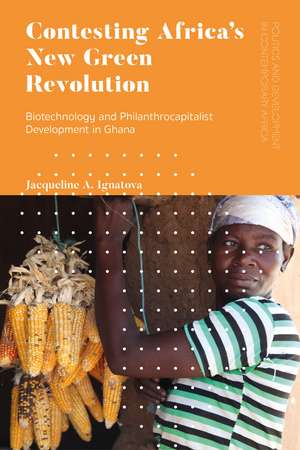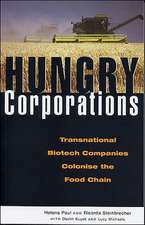Contesting Africa’s New Green Revolution: Biotechnology and Philanthrocapitalist Development in Ghana: Politics and Development in Contemporary Africa
Autor Jacqueline A. Ignatovaen Limba Engleză Hardback – 16 iun 2021
| Toate formatele și edițiile | Preț | Express |
|---|---|---|
| Paperback (1) | 307.67 lei 43-57 zile | |
| Bloomsbury Publishing – 28 dec 2022 | 307.67 lei 43-57 zile | |
| Hardback (1) | 668.88 lei 22-36 zile | +19.30 lei 5-11 zile |
| Bloomsbury Publishing – 16 iun 2021 | 668.88 lei 22-36 zile | +19.30 lei 5-11 zile |
Din seria Politics and Development in Contemporary Africa
-
 Preț: 140.00 lei
Preț: 140.00 lei - 8%
 Preț: 153.16 lei
Preț: 153.16 lei -
 Preț: 144.38 lei
Preț: 144.38 lei -
 Preț: 319.33 lei
Preț: 319.33 lei -
 Preț: 307.67 lei
Preț: 307.67 lei - 21%
 Preț: 217.82 lei
Preț: 217.82 lei - 14%
 Preț: 159.11 lei
Preț: 159.11 lei - 14%
 Preț: 158.73 lei
Preț: 158.73 lei - 13%
 Preț: 161.32 lei
Preț: 161.32 lei - 13%
 Preț: 170.80 lei
Preț: 170.80 lei - 13%
 Preț: 160.87 lei
Preț: 160.87 lei - 13%
 Preț: 161.76 lei
Preț: 161.76 lei - 30%
 Preț: 570.76 lei
Preț: 570.76 lei - 23%
 Preț: 159.53 lei
Preț: 159.53 lei - 20%
 Preț: 196.08 lei
Preț: 196.08 lei - 30%
 Preț: 567.75 lei
Preț: 567.75 lei - 23%
 Preț: 197.94 lei
Preț: 197.94 lei - 23%
 Preț: 190.75 lei
Preț: 190.75 lei - 23%
 Preț: 190.59 lei
Preț: 190.59 lei - 23%
 Preț: 193.18 lei
Preț: 193.18 lei - 24%
 Preț: 196.89 lei
Preț: 196.89 lei - 23%
 Preț: 193.26 lei
Preț: 193.26 lei
Preț: 668.88 lei
Preț vechi: 815.70 lei
-18% Nou
Puncte Express: 1003
Preț estimativ în valută:
127.99€ • 133.99$ • 105.90£
127.99€ • 133.99$ • 105.90£
Carte disponibilă
Livrare economică 17-31 martie
Livrare express 28 februarie-06 martie pentru 29.29 lei
Preluare comenzi: 021 569.72.76
Specificații
ISBN-13: 9781786996558
ISBN-10: 1786996553
Pagini: 216
Dimensiuni: 156 x 234 x 20 mm
Greutate: 0.48 kg
Editura: Bloomsbury Publishing
Colecția Zed Books
Seria Politics and Development in Contemporary Africa
Locul publicării:London, United Kingdom
ISBN-10: 1786996553
Pagini: 216
Dimensiuni: 156 x 234 x 20 mm
Greutate: 0.48 kg
Editura: Bloomsbury Publishing
Colecția Zed Books
Seria Politics and Development in Contemporary Africa
Locul publicării:London, United Kingdom
Caracteristici
Offers a new take on the much-contested 'Green revolution' in Africa, showing how GM's actual effects on the ground have been far more complex than either proponents or critics of the technology have acknowledged
Notă biografică
Jacqueline A. Ignatova is an Assistant Professor of Sustainable Development at Appalachian State University in North Carolina, USA. She is vice chair of the board of F.A.R.M. (Feed All Regardless of Means) Cafe and a co-founder of the Watauga Seed Library in Boone, North Carolina. Her work has been featured in Third World Quarterly and African and Black Diaspora: An International Journal.
Cuprins
Acknowledgments List of abbreviations PrefaceIntroductionChapter 1: Green Revolution discourse, structural adjustment, and the "enabling environment" for agribusinessChapter 2: Philanthrocapitalism and the politics of public-private partnershipsChapter 3: Biocapital, "pro-poor" biotechnology, and legislative changes in the seed sectorChapter 4: Technological savior or terminator gene? Biotechnology, food security, and the political economy of hypeChapter 5: Experts, entrepreneurs, and the "last mile user"Interlude: On "mixing"Chapter 6: Neocolonial anxietiesConclusion
Recenzii
Ignatova's important book illuminates profound problems with public-private partnerships that skirt democratic accountability and empower wealthy interests at the expense of local communities. But it's not a despairing account: she centres Ghanaian activists and policy-makers who are pioneering a new type of philanthropy, one emphasizing interdependency and social justice over anti-democratic efforts to privatize seed commons. A revelatory and insightful study.
Like a combine through a field of genetically modified maize, Jacqueline Ignatova cuts through the rhetoric surrounding the 'Green Revolution for Africa' to reveal the underlying power, politics and inequities that shape agricultural development in contemporary Ghana. Full of rich empirics and analytical insights, this book is essential reading for those seeking a comprehensive understanding of how public-private partnerships and philanthropy-driven initiatives are reshaping smallholder agriculture across the African continent.
Like a combine through a field of genetically modified maize, Jacqueline Ignatova cuts through the rhetoric surrounding the 'Green Revolution for Africa' to reveal the underlying power, politics and inequities that shape agricultural development in contemporary Ghana. Full of rich empirics and analytical insights, this book is essential reading for those seeking a comprehensive understanding of how public-private partnerships and philanthropy-driven initiatives are reshaping smallholder agriculture across the African continent.








